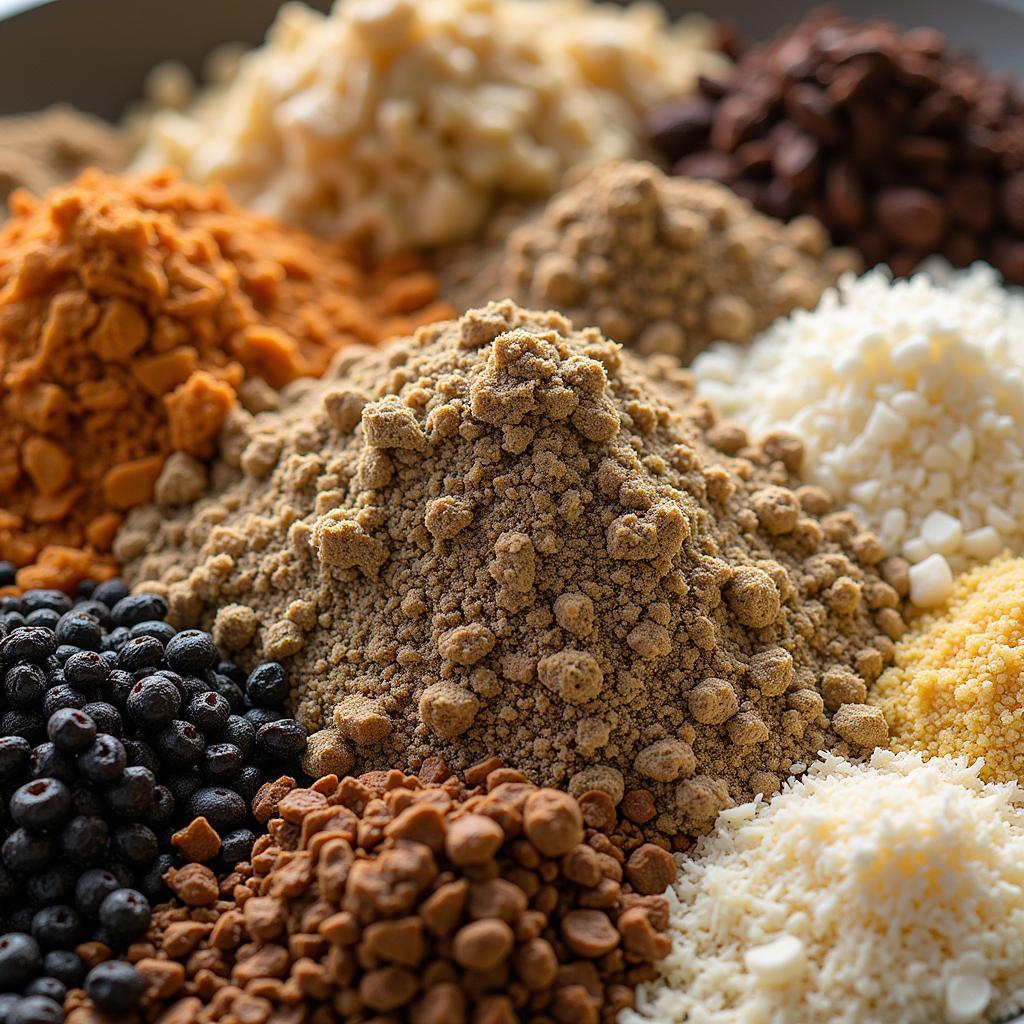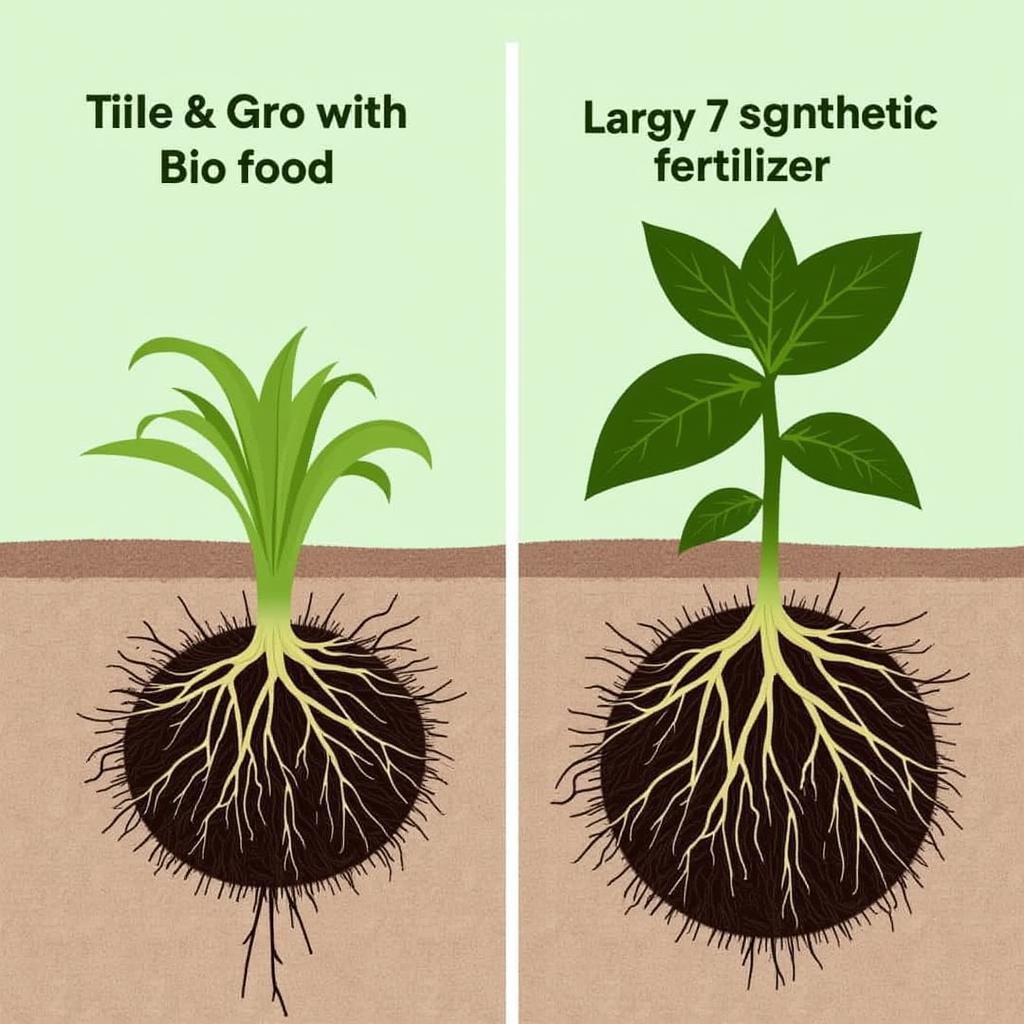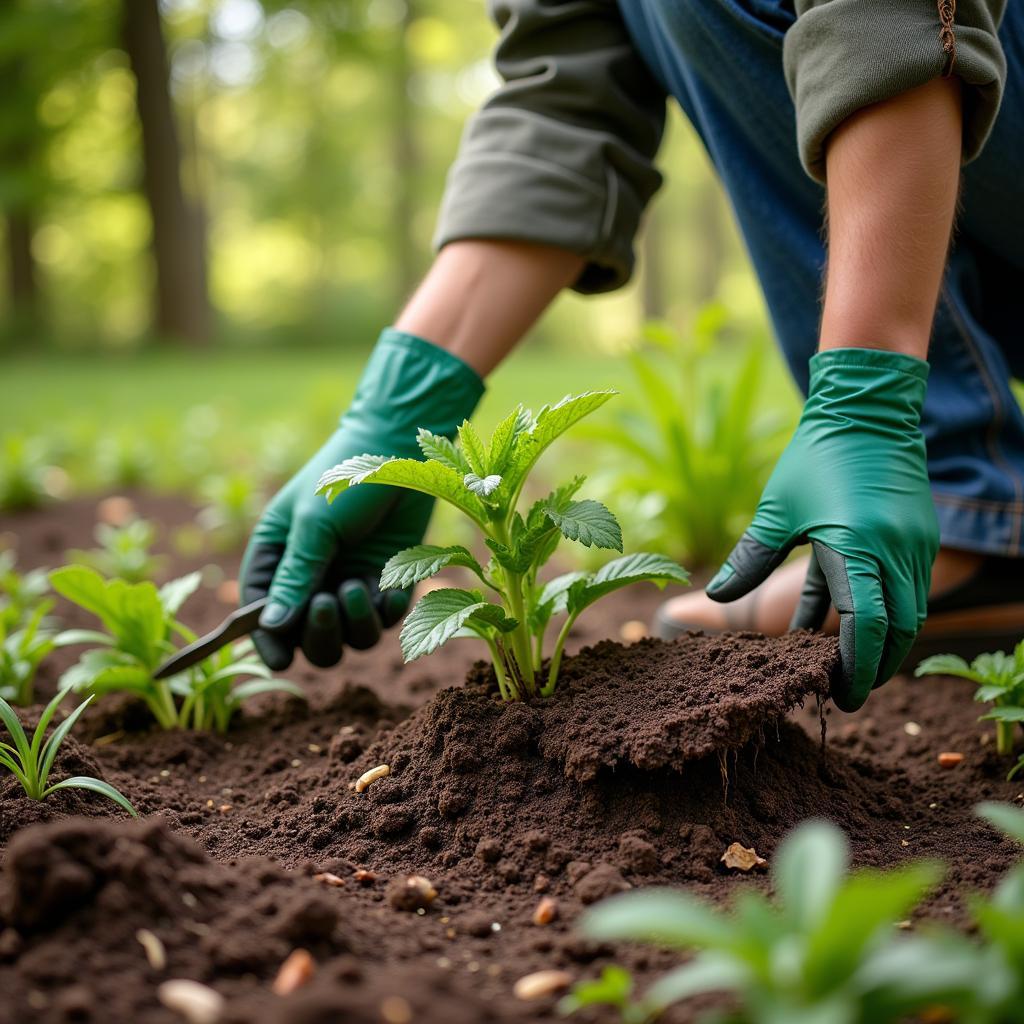In a world increasingly dominated by synthetic solutions, it’s refreshing to rediscover the power of nature, especially when it comes to our plants. “Bio Food For Plants” isn’t just a trendy term – it’s a return to the fundamentals of healthy growth and vibrant gardens. Let’s dive into the fascinating world of organic nourishment and unlock the potential lying dormant within your soil.
Understanding the Essence of Bio Food for Plants
Unlike synthetic fertilizers that offer a quick fix, bio food for plants, also known as organic fertilizer, takes a holistic approach. It’s about nourishing the entire ecosystem within your soil, fostering a thriving community of beneficial microbes that play a crucial role in plant health.
Instead of force-feeding plants with readily available nutrients, bio food provides a slow and steady release of essential elements as organic matter decomposes. This mimics nature’s rhythm, promoting robust root development, improved soil structure, and increased nutrient uptake – the cornerstones of truly flourishing plants.
 Bio Food Ingredients
Bio Food Ingredients
The Multifaceted Benefits of Choosing the Bio Route
Embracing bio food for plants isn’t just about switching fertilizers; it’s about aligning with a philosophy that prioritizes sustainability and long-term plant health. Here’s why making the switch is a decision you won’t regret:
-
Enhanced Soil Fertility: Bio food is like a vitamin boost for your soil. It introduces beneficial microorganisms that decompose organic matter, releasing essential nutrients and improving soil structure. This creates a fertile foundation for your plants to thrive.
-
Sustainable and Eco-Friendly: By opting for bio food, you’re choosing a planet-friendly approach. Unlike synthetic fertilizers that can contribute to water pollution and harm beneficial insects, bio food degrades naturally, enriching the soil without causing harm.
-
Increased Nutrient Density: Studies have shown that plants grown with bio food tend to have a higher concentration of essential vitamins and minerals. This translates to more nutritious food for you and your family.
 Healthy Plant Roots
Healthy Plant Roots
Unlocking the Power of Bio Food: Practical Tips for Every Gardener
Ready to harness the power of bio food in your garden? Here’s a step-by-step guide to get you started:
-
Know Your Soil: Just like us, plants have specific dietary needs. Conduct a soil test to determine its pH level and nutrient composition. This will guide you in selecting the most appropriate bio food for your plants.
-
Diversity is Key: Just as we thrive on a varied diet, plants benefit from a diverse range of nutrients. Opt for bio food options that incorporate a blend of organic matter, such as compost, manure, bone meal, and seaweed extract.
-
Timing is Everything: Apply bio food during your plants’ active growing season to maximize nutrient absorption. This is typically during spring and summer, when plants are putting on new growth.
-
Less is More: Start with small amounts of bio food and gradually increase the quantity as needed. Over-fertilizing, even with organic options, can be detrimental to plant health.
 Applying Bio Food
Applying Bio Food
Choosing the Right Bio Food: Navigating the Options
The world of bio food for plants offers a diverse range of options, each with its unique benefits. Here’s a quick rundown:
-
Compost: Often referred to as “black gold,” compost is a gardener’s best friend. It’s a nutrient-rich blend of decomposed organic matter, improving soil structure and providing a slow release of essential nutrients. Learn more about creating a thriving food web in your garden through composting on our food web mountain page.
-
Manure: Aged manure from herbivores like cows, horses, or chickens is a fantastic source of nitrogen, phosphorus, and potassium – the primary nutrients plants need for healthy growth.
-
Bone Meal: Rich in phosphorus, bone meal encourages strong root development, making it an excellent choice for transplanting or establishing new plants.
-
Fish Emulsion: A fast-acting source of nitrogen, fish emulsion gives plants a quick boost of energy, promoting lush foliage growth.
From Seed to Harvest: Embracing Bio Food for a Flourishing Garden
Switching to bio food for plants is a journey that connects you with nature’s rhythms and rewards you with a thriving, sustainable garden. By nourishing your soil and fostering a healthy ecosystem, you’re not just growing plants – you’re cultivating a legacy of health and vitality for generations to come. Ready to transform your garden with the power of nature? Explore our selection of best brassica food plot seed and discover the joys of growing food, not grass, as we discuss in our article on grow food not grass. Together, let’s embrace the magic of bio food and cultivate a greener, healthier future, one plant at a time.
FAQs about Bio Food for Plants
1. Is bio food suitable for all types of plants?
Yes, bio food is generally beneficial for all plant types. However, the specific nutrient requirements may vary. Conduct a soil test to determine the ideal bio food composition for your plants.
2. How long does it take for bio food to show results?
Unlike synthetic fertilizers that offer a quick fix, bio food works gradually. You’ll start noticing improvements in soil structure and plant health within a few weeks, with more noticeable results over time.
3. Can I make my own bio food?
Absolutely! Composting is an excellent way to create your own nutrient-rich bio food.
4. Where can I buy high-quality bio food for my plants?
Many garden centers and online retailers offer a variety of bio food options. Look for reputable brands that prioritize organic and sustainable practices.
5. Does bio food have an odor?
Some types of bio food, such as manure, may have a distinct odor, especially when freshly applied. However, the smell usually dissipates within a few days.
6. Can I over-fertilize with bio food?
While bio food is generally gentler than synthetic fertilizers, it’s still possible to over-fertilize. Always start with small amounts and observe your plants for any signs of nutrient burn.
7. Is bio food more expensive than synthetic fertilizer?
Bio food can sometimes be slightly more expensive than synthetic options. However, the long-term benefits for your soil, plants, and the environment make it a worthwhile investment.
Need Help Creating the Perfect Food Plot for Wildlife?
Contact us today for personalized advice! We can help you choose the best turkey food plot or guide you on the best food plots for deer in mn.
For immediate assistance:
- Call: 02437655121
- Email: minacones@gmail.com
- Visit: 3PGH+8R9, ĐT70A, thôn Trung, Bắc Từ Liêm, Hà Nội, Việt Nam
Our dedicated customer support team is available 24/7 to answer your questions and provide expert guidance.